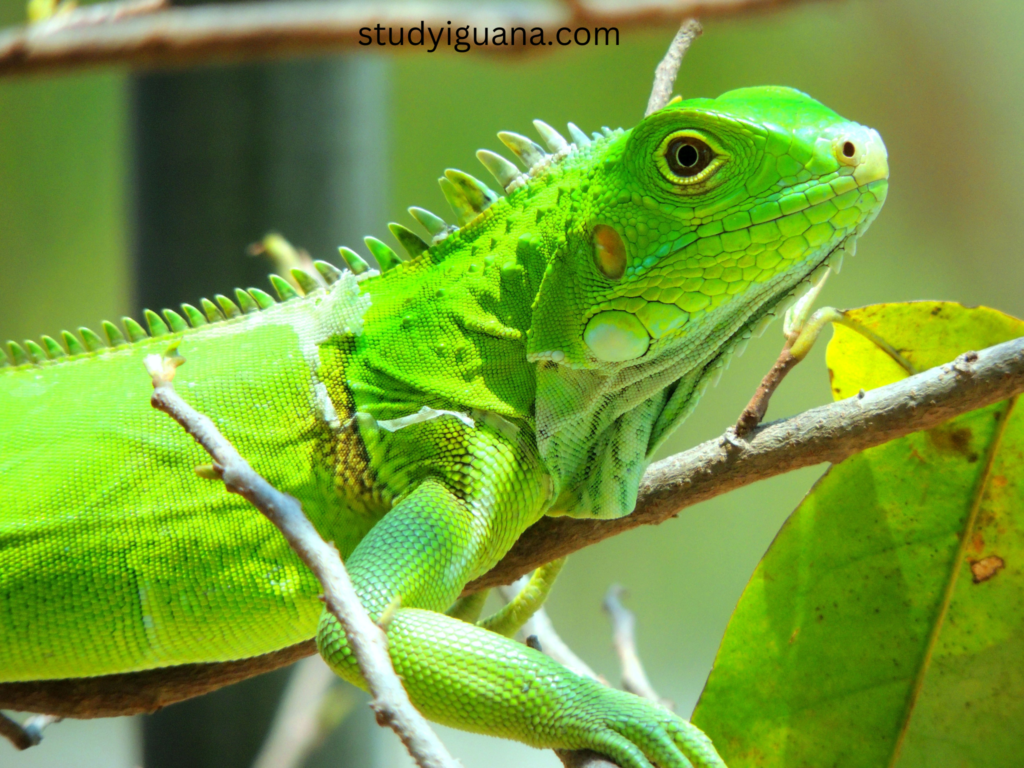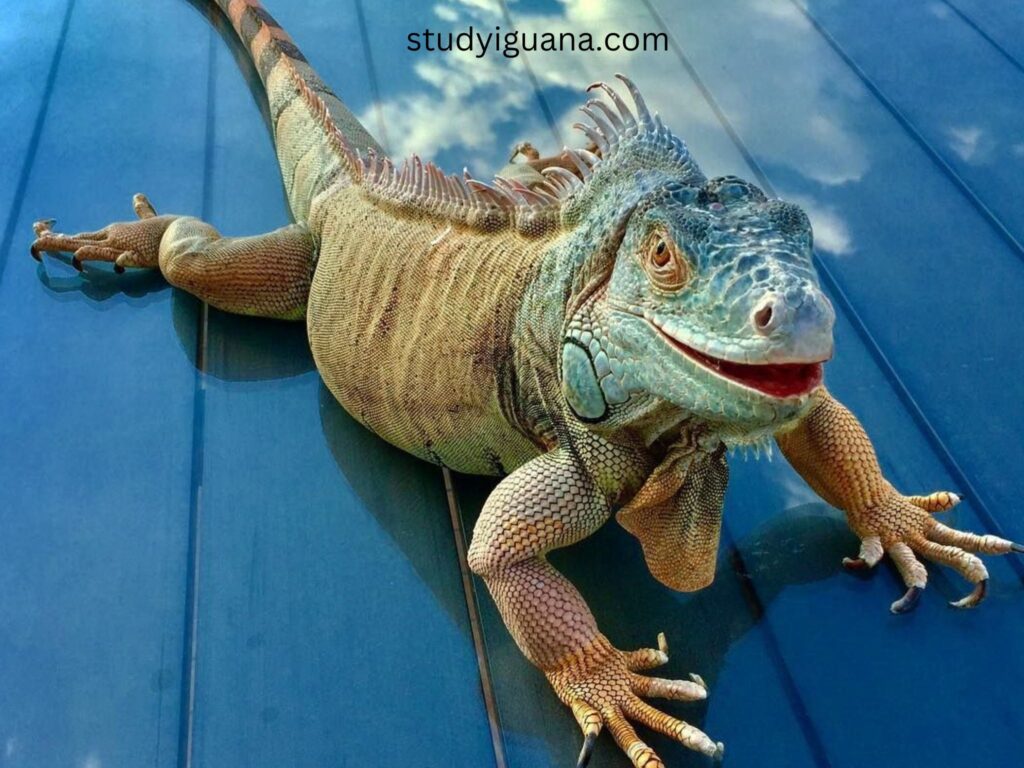Do iguanas make noise? Have you done any research into the habits and routines of iguanas? The most natural inquiry
concerns the iguana’s vocalizations. There are often two distinct sounds made by iguans. The animals make a variety of noises, some of which are produced by their nostrils (similar to a quiet sneeze) and others by their tails (as they walk).
Keep reading to learn the different sounds an iguana may produce.
What type of noise does the iguana make?
Do iguanas make noise? Discover the truth about iguana sounds, their rare noises, and what they mean in this insightful guide. When compared to other common house pets like dogs and cats, iguanas are surprisingly quiet. You might be expecting or pleasantly surprised when your new pet iguana makes its first noises in your house. Iguanas, like many other reptiles, are notably silent creatures. If you’re the proud owner of an iguana, you should know that it produces one of two main noises. The initial noise is significantly softer than a sneeze; it sounds like someone is snorting or sneezing lowly. That sound is what they produce when anything gets lodged inside their bodies.
The accumulation is usually due to an excess of salt in one’s diet or surrounding environment. If you aren’t paying close attention, you could not hear them snort and sneeze the stuff out of their nose. So, the answer to the question, Do iguanas make noise? can’t be answered directly. Their snorting causes a discharge that is both gritty and runny. The iguana may sneeze or snort lightly, and it may cough quietly, all in an effort to expel the foreign matter lodged in its system.
You should keep a watch on your iguana if you see that it is coughing frequently rather than sometimes, and perhaps even take it to the vet if the problem persists. Iguanas are notable for the whirring noise their tails generate when they move. When iguanas are angry or trying to scare away prospective predators, they often create the whipping sound.
Curious to know: Do iguanas make noise? Learn about the rare sounds iguanas can produce and what triggers them. Look around the iguana’s enclosure to check if anything seems to be bothering it if it starts making whipping noises. Insects can easily enter inside the cage if you leave the entrance open, which might cause problems for your iguana. The iguana’s tail could be injured if whatever is irritating it is not removed.

Do Iguanas Make Noise to Communicate?
Iguana’s snorting causes a discharge that is both gritty and runny. The iguana may sneeze or snort lightly, and it may cough quietly, all in an effort to expel the foreign matter lodged in its system. You should keep a watch on your iguana if you see that it is coughing frequently rather than sometimes, and perhaps even take it to the vet if the problem persists. Iguanas are notable for the whirring noise their tails generate when they move. When iguanas are angry or trying to scare away prospective predators, they often create the whipping sound.
For those new to keeping reptiles, the question is, Do iguanas make noise? often arises due to their usually silent nature. Look around the iguana’s enclosure to check if anything seems to be bothering it if it starts making whipping noises. Insects can easily enter inside the cage if you leave the entrance open, which might cause problems for your iguana. The iguana’s tail could be injured if whatever is irritating it is not removed.
How Do Iguanas Communicate?
If you’ve ever observed an iguana closely, you may have wondered, Do iguanas make noise? as part of their communication? So, how do iguanas communicate with one another if they don’t employ sounds like your cat or dog could make, such as barking or yowling? Though they may not be able to communicate verbally, iguanas in the wild will nevertheless use signs to communicate with humans and one another.
These animals typically use body language as a means of communication within their own species.
The iguana uses its body language to navigate its environment, communicate with others, find mates, and hunt for food. You can provide better care for your iguana if you understand the language it uses to communicate with its own body. If you’re wondering, do iguanas make noise? It’s worth noting that their sounds are rare but can be distinct in certain contexts.
Displaying Dominance
The inquiry: do iguanas make noise? sparks curiosity, especially since most reptiles are known for their quiet demeanor. When an iguana fully extends its back legs, it is either displaying dominance or expressing surprise. If an iguana or other animal wants to prove its superiority over another, it will stand on its hind legs and sit on its hind thighs. When the iguana wants to assert its dominance, it may lengthen the dewlap below its chin. Under their chins, iguanas have a “dewlap,” a flap of additional skin. In addition, there could be a lot of swaying from side to side and up and down. Indicators of anger or distress in your iguana include rapid head movement.
Reproduction of Iguana
Do iguanas make noise? in social situations. While not vocal like mammals, they may use body language and minimal sounds. The full-body posture of an iguana standing on its hind legs might be a display of dominance or a sign of fear. Standing and sitting on their hind legs makes them appear taller and larger than their rival, whether it be another iguana or another animal.
The iguana will also attempt to assert its dominance by elongating the skin fold under its chin. The “dewlap” under an iguana’s chin is simply an additional skin flap. You may also notice a lot of up and down and side-to-side head nodding. If the iguana’s head is jerking, it’s likely unhappy or irritated.
Over Stimulation
You may have noticed your iguana sitting in its cage with its eyes closed soon after you brought it home. If your iguana is trying to adapt to its ever-changing environment, this behavior is likely why. The iguana is having a hard time adjusting to its new environment, which is full of novel sights, sounds, and, most importantly, people. With time and familiarity, your iguana will begin to gradually open its eyes, until eventually both eyes are wide open.
Emotional State of Your Iguana
Ever wondered, Do iguanas make noise? Explore the surprising facts about iguana sounds and their behavior in this detailed article. The body language of your iguana will reveal whether it is furious, sad, or joyful. A content iguana will go about its daily routine with typical sneezes and movements. A sign of trouble is a silent animal. Iguanas’ inactivity and lack of vocalization are telltale signs of depression. Your iguana may be ill or merely aggravated, but either way, you should take notice. You’ll need to observe your own iguana to understand its temperament and habits. You can use this to better understand how you’re feeling or what might be wrong.

Conclusion
Iguanas typically spend their time calmly perched on a limb or exploring the confines of their enclosure. Almost as silent as other reptiles, an iguana’s tail may make a snort, sneeze, or whip sound if you pay close enough attention. Learning to recognize your pet’s individual vocalizations and tone of voice will help you provide more effective care. For those new to keeping reptiles, the question is, Do iguanas make noise? often arises due to their usually silent nature.
FAQS
Do iguanas have a voice?
They have no vocal cords. “The most you will hear from an iguana is heavy breathing when it’s very displeased,” she said. An iguana’s main source of defense on such occasions—such as being cornered—is not biting or scratching but whipping its tail.
How do Iguanas warn you?
Most species aren’t particularly aggressive towards humans or other animals unless they are provoked or stressed. They also display plenty of warning signals before they bite, like rapid head bobbing, defensive tail whipping, or hissing
What are iguanas afraid of?
Iguanas are really afraid of water spraying because they don’t like the sound produced by the water when it gushes of a hose pipe. Spraying water on iguanas will scare them, and they run away immediately from a yard. Iguanas are really scared of light produced by some products.
Can iguanas understand you?
The hidden language you need to understand
Understanding your iguana is key to getting to know them and their personalities. They will communicate with you, not verbally but with head movements and with their eyes and body movements as well.
Are iguanas violent?
Iguanas aren’t dangerous or aggressive to humans, but they damage seawalls, sidewalks, landscape foliage, and can dig lengthy tunnels. The males can grow to at least 5 feet (1.5 meters) long and weigh nearly 20 pounds (9 kilograms).
Additional readings

Very nice information. I want to have a little one.